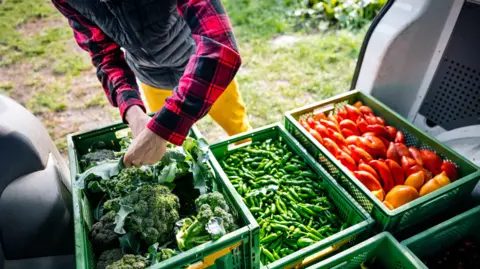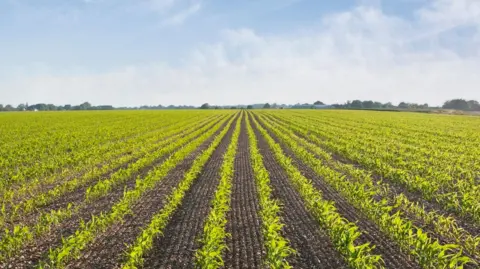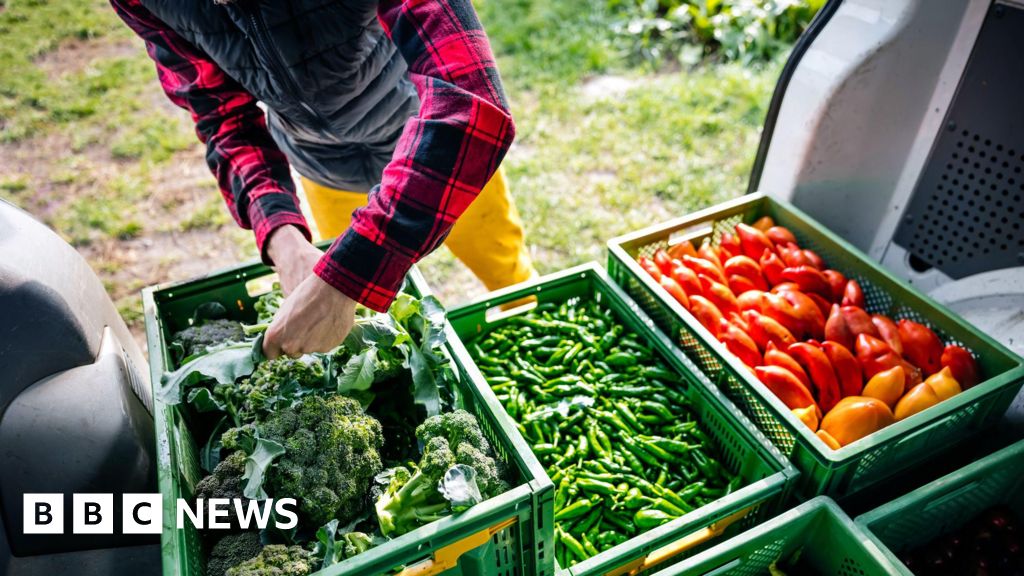 Getty Images
Getty ImagesMost food and plant products will be allowed “to flow freely again” between Northern Ireland and Great Britain as the result of a new UK-EU deal, the government has said.
The agri-food deal will remove “routine checks” on animal and plant products moving between GB and NI and will reduce, but not remove, the trade border in the Irish Sea which was introduced as a result of Brexit.
When the deal is eventually implemented it should mean no physical checks on GB food products at NI ports but customs declarations will still be needed.
The government said the broader UK-EU deal “could lower food prices and increase choice on supermarket shelves”.
What’s in the new UK/EU deal?
Prime Minister Sir Keir Starmer announced the wide-ranging agreement affecting food, fishing and security after hosting EU leaders at a summit in London.
It includes a new SPS agreement – which stands for sanitary and phytosanitary and refers to rules about animals and food.
The government said this would reduce red tape for businesses, simplify food exports and imports, and help cut lorry queues at borders.
The deal also includes a new security and defence partnership between the UK and EU, and new arrangements for passport checks.
British holidaymakers will soon be able to use more eGates in Europe, which the government said would “end the dreaded queues” at border control.
Sir Keir said the deal would be “good for jobs, good for bills and good for our borders”.
However, critics accused the Labour government of betraying Brexit voters as the UK will have to follow EU agri-food rules without having a say in how those rules are made.
There are also concerns about a 12-year fishing deal granting the EU access to UK waters, which is included as part of the overall agreement.
Conservative Party leader Kemi Badenoch said the UK was “becoming a rule-taker from Brussels once again”.
But the Labour government said it was time to “reset” relations with the EU which is the UK’s biggest market.
Business Secretary Jonathan Reynolds said the UK’s agricultural food exports were down by a fifth, and the new deal would reduce trade friction and costs.
How will the UK/EU deal affect NI?
 Getty Images
Getty ImagesBy John Campbell, NI economics and business editor
The agri-food deal between the EU and UK should substantially ease trade from Great Britain to Northern Ireland.
The UK has agreed that it will align with EU rules on agri-food which will mean Northern Ireland and Great Britain return to following the same set of rules.
That will mean food being shipped from Great Britain to Northern Ireland will no longer need the paperwork and checks which have been in place since 2021.
The deal needs to be finalised as a legal text, which could take several months, with any implementation likely be to next year at the earliest.
The deal will also cover the trade in horticultural products like seeds and garden plants.
Northern Ireland’s current trading arrangement came about as the result of a Brexit deal between the EU and UK in 2019, which was revised in 2023, and is now known as the Windsor Framework.
They agreed that the most practical way to keep the border open between Northern Ireland and the Republic of Ireland was for Northern Ireland to follow many EU laws on the regulation of goods.
However this means that goods coming from the rest of the UK into Northern Ireland face checks and controls to ensure they meet EU rules.
This arrangement has become known as the Irish Sea border.
It has had a particular impact on the food industry as Northern Ireland supermarkets are still largely supplied from distribution centres in England and Scotland.
The new deal should substantially reduce the impact of the sea border for food and plants as there will be no regulatory differences between Northern Ireland and Great Britain.
However the deal does not cover the trade in animal medicines which is currently covered by a “grace period”.
When that grace period ends in December it means Northern Ireland will have to follow EU rules which could lead to disruption of supplies from Great Britain.
Deal ‘will not solve all the challenges’
Business organisations have been digesting the details of what the agreement means for Northern Ireland.
Rain Newton-Smith, chief executive of the Confederation of British Industry, said the SPS agreement was “a significant win which should facilitate smoother trade”.
The Northern Ireland Chamber of Commerce and Industry also welcomed the agreement but said it “would not solve all the challenges our members face”.
“We would like to see greater aspiration to tackle regulatory divergence more broadly, and to reduce the customs burden under the Windsor Framework,” said its chief executive Suzanne Wylie.
Tina McKenzie, from the Federation of Small Businesses, said the deal marked “genuine progress by untangling the rules for small exporters of plant and animal products”.
“Of course, this deal does not solve every challenge overnight, but it sets a very welcome new tone,” she added.
Ulster Farmers’ Union President William Irvine described the agreement as “a significant breakthrough” that brings “real, long-term certainty” for their members and the wider agri-food industry.


